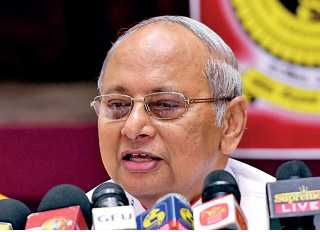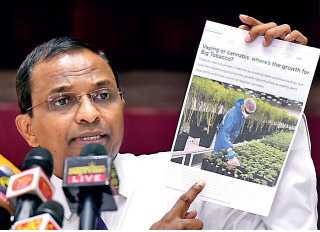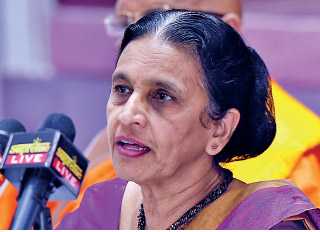Thursday Feb 19, 2026
Thursday Feb 19, 2026
Wednesday, 23 September 2020 03:01 - - {{hitsCtrl.values.hits}}
By Shailendree Wickrama Adittiya
 |
| Sri Lanka Temperance Association Chairman venerable Dr. Ittapana Dhammalankara |
 |
| Archbishop of Colombo Malcolm Cardinal Ranjith |
 |
| Mahesh Rajasuriya of Sri Lanka College of Psychiatrists |
 |
| Sri Lanka Temperance Association Deputy Chairman Prof. Anula Wijesundera
|
Temperance and medical associations as well as members of the clergy yesterday raised concerns about discourse and propaganda promoting the legalisation of cannabis in Sri Lanka, stating decriminalisation offered no significant benefits to the country.
At a press briefing yesterday, Sri Lanka Temperance Association Deputy Chairman Prof. Anula Wijesundara stated that the legalisation of cannabis cultivation and the resulting increase in supply will lead to an increase in demand for the drug.
She was also representing the Sri Lanka Medical Association as its immediate past president and the National Dangerous Drug Control Board (NDDCB) as a member and said the NDDCB opposed the legalisation of cannabis in Sri Lanka.
Prof. Wijesundara added that the NDDCB had received a proposal from a US company for the cultivation of cannabis in Embilipitiya and manufacturing of medication via the State Pharmaceuticals Corporation of Sri Lanka to be exported to the US.
While she did not reveal more details about the proposal, Prof. Wijesundara added: “We rejected this proposal and informed the State Pharmaceutical Corporation about it. We consider this a victory.”
SLTA Chairman Ven. Dr. Ittapana Dhammalankara also opposed efforts to legalise the cultivation and use of cannabis, saying the trade should be looked at as a national problem with the potential of destroying the country.
“This is no longer an ordinary problem and has become a national issue. Politicians and organisations should show the same interest as the President in controlling the usage of cannabis in Sri Lanka,” he said, adding that this was the responsibility of the Government.
He also commended President Gotabaya Rajapaksa for his efforts to control drug usage in the country.
Echoing these views were other members of the SLTA as well as Archbishop of Colombo Malcolm Cardinal Ranjith, who said: “In recent times, drugs have been used in all parts of the country to destroy the lives of young people and many parents have approached us asking for help to save their children.”
Cardinal Ranjith added that it is the responsibility of religious institutions to protect the youth of the country, which was why he was extending his support to the monks heading the Sri Lanka Temperance Association.
“I request, again and again, from the country’s governing bodies to not legalise the cannabis trade or relax existing laws,” he added, and went on to request that businesses do not promote such activities in exchange for monetary gains.
Sri Lanka College of Psychiatrists Member and Colombo University Senior Lecturer in Psychiatry Dr. Mahesh Rajasuriya shared his views on the legalisation of cannabis in Sri Lanka as well. Addressing the medical use of cannabis, Dr. Rajasuriya said the drug was not a medicine but merely an ingredient used to make certain types of medications.
He added that evidence proving the medicinal uses of cannabis were insufficient and, at most, moderate. Dr. Rajasuriya went on to explain that the negative effects of cannabis usage, especially in terms of mental illness, saying cannabis usage could result in the worsening of existing conditions as well as the development of mental illness, especially in those at higher risk due to genetic predisposition.
“All psychiatrists in Sri Lanka feel a great destruction could occur. Every day that we step into the ward, we see at least one individual, usually a young person, experiencing mental illness due to the use of cannabis,” he added.
He went on to say that studying organisations that promote the cultivation of cannabis and its medicinal benefits and supported or conducted research pointed to a single fact. “With the legalisation of cannabis, tobacco companies can revive declining businesses,” he said.
He explained that the legalisation of cannabis cultivation would allow declining tobacco companies to use their farms, farmers, production arms, and packaging and marketing infrastructure for cannabis products.
Dr. Rajasuriya went on to question the need for legalising cultivation when synthetic cannabinoids exist as well as the export value of Sri Lanka’s strains with low tetrahydrocannabinol or THC when genetically-modified strains of a better quality are available elsewhere in the world.
Pix by Ruwan Walpola